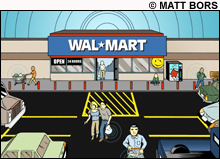
WE'LL BE WATCHING: RFIDs have popped up everywhere.
|
When Conrad Chase, director of Barcelona’s Baja Beach Club, asked his VIP customers if they wanted a microchip implanted in their arms, many of them didn’t think twice. After all, the minuscule chip facilitated unheard-of freedom of movement, since it could be scanned to reveal a person’s identification and credit-card information, allowing customers to leave their wallets and handbags at home. It seemed like the ultimate form of convenience, and soon clubgoers in Glasgow and Rotterdam were latching on to the trend. “I know many people who want to be implanted,” Chase told CNN in 2004. “Almost everybody now has a piercing, tattoos, or silicone. Why not get the chip and be original?” Two years later, the subcutaneous chips haven’t yet taken American club kids by storm, but it seems the remote-sensory technology — called radio-frequency identification (RFID) — is popping up everywhere else. The technology, which was largely researched and developed in Boston, is already being used in EZ Pass transponders, garage-door openers, and cell phones. Some cities, including Los Angeles, are making them mandatory for all adopted pets, and many schools are hailing efforts to embed them in children’s ID cards. Meanwhile, manufacturers are using RFID tags, which consist of a flat antenna and an embedded chip that can be as small as a grain of sand, to track packages as their goods travel throughout the world.
The RFID industry has much bigger plans, and with tag prices dropping dramatically over the past three years, it’s primed to explode. An increasing number of retailers want to put RFID tags on every item in their stores, making manual inventory and even shoplifting things of the past. The health-care industry is planning to use RFID to track patients and cut down on medical errors, the US government wants to put chips in passports, and the European Union will soon embed the microchips in its currency. The American company VeriChip is already selling implantable forms of RFID — like the ones used in that Barcelona bar — similar to those used to track pets.
“RFID will revolutionize our lives and change the way we live,” says Dr. Peter Harrop, chairman of the RFID consulting company ID Tech EX, which sponsored an RFID trade show in Boston last month. Indeed, officials at MIT Auto-ID, a consortium of scientists and corporations that set up shop seven years ago to develop modern applications for the technology, say the tiny chips could one day be used to track every item on earth.
The industry is keeping mum about when and how all this will unfold, but it already has privacy advocates scared. They worry that information contained on RFID chips can be stolen or read remotely. Even worse, they say, once RFID tags are attached to every item, humans can potentially be tracked through tags embedded in the items they carry and wear. The writing is already on the wall: IBM has filed an RFID-reader patent to track people, and Gillette has used tags to spy on Wal-Mart customers in Brockton, Massachusetts. You don’t have to believe in the Mark of the Beast, as some critics do, to fear this technology’s invasive and dehumanizing potential.